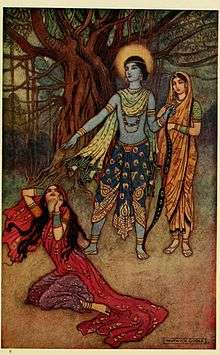Shurpanakha
| Shurpanakha | |
|---|---|
 The humiliation of Shurpanakha by Warwick Goble, 1913 | |
| Information | |
| Family | |
Shurpanakha (IAST: Śūrpaṇakhā; lit. "sharp, long nails") or Surpanakha is a pivotal character in Valmiki's epic, the Ramayana, and is the sister of the main antagonist, Ravana, King of Lanka.[1] She is known as Sarpakanaka in Indonesian, Surpanakhar in Khmer, Surapandaki in Malay, and Sammanakkha in Thai.
Description and biography

Valmiki describes Shurpanakha by the time of the Ramayana's events as generally ugly (gora mukhi):
- Pot bellied
- cross-eyed
- Thinning, brown hair
- A grating voice that is harsh on the ears.
- Oversized breasts; this can be translated to mean a heart full of wickedness.
The youngest child of Rishi Vishrava and his second wife, Kaikesi, Shurpanakha was given the name of Minakshi "Diksha" at birth. As beautiful as her mother Kaikesi and her grandmother Ketumati had been before her, Shurpanakha grew up and secretly married the Danavas prince of Kalkeya Danava clan, Vidyutjihva.Ravana got furious at Shurpanakha for marrying a Danava the affirmed enemies of Rakshasas and was about to punish her but Mandodari convinced him to respect the wish of his sister,thus Ravana accepted Shupanakha, her husband and danavas as relatives officially.At the time of conquering Rasatala (the underworld), her brother, Ravana decided to visit her newly married sister,where he confronts Vidyutjihva's true motives to marry Shurpanakha to kill Ravana,in Shurpanakha's absence Vidyutjihva attackedkka Ravana in defence he killed his brother-in-law.[2] This earned Ravana his hurt and miserable sister's great displeasure, and the widowed Shurpanakha then split her time between Lanka and the woods of Southern India, sometimes,living with her forest-dwelling Asura relatives, Khara and Dushana,on Ravana's orders
According to Valmiki, she met the exiled Prince Rama of Ayodhya, during one such visit to the Forest of Panchavati, and was instantly smitten by his youthful good looks. Rama meanwhile spurned her advances, telling her that he was faithful to his wife Sita and thus would never take another wife. Rejected, Surpankha then approached his younger brother, Lakshmana, who reacted in a similar manner and said she was not what he desired in a wife. Eventually seeing that the brothers were making fun of her, the humiliated and envious Shurpanakha attacked Sita but was thwarted by Lakshmana, who cut off her nose and sent her back to Lanka.
Shurpanakha first went to her brother Khara, who sent 7 Rakshasa warriors to attack Rama, who easily dispatched them. Khara himself then attacked along with 14,000 soldiers, all of which were killed except for Akampan, Sumali's son and Kaikesi's brother, who fled to Lanka. She then went straight to Ravana's court and enticed her brother to abduct and wed Sita by extolling her virtues and beauty. Despite opposition from their brother, Vibhishana, Ravana kidnapped Sita, triggering the Battle of Lanka.
Although Shurpanakha receives no further mention from Valmiki, it has been suggested that she continued to live in Lanka after Vibhishana succeeded Ravana as king. She and her half-sister Kumbini are supposed to have perished at sea a few years later.
Alternative accounts
Some versions of the Ramayana claim that Shurpanakha had no real romantic interest in the brothers, engineering Ravana's death in revenge for her husband Vidyujjihva's murder. After many years of plotting his downfall, she realised that Ravana had more than a match in Rama, who had killed both her brothers, Khara and , Dushana. Her cousins were terrified of Rama, so Shurpanakha decided to pit her brother against Rama, knowing only he was powerful enough to slay her brother.
Kamban's description

The Tamil poet Kamban offers a kinder description of Shurpanakha than Valmiki's, describing her instead as a very beautiful woman with long, beautiful, fish-shaped eyes (validating her birth name of Minakshi), a slender figure and bewitching personality. In addition, she possessed magical powers and could assume any form, an ability which Kamban asserts she used in trying to seduce Rama. The prince was able to see past Shurpanakha's ruse and decided to play with her for a while before declining her marriage proposal.
Krittivasa's description
Bengali poet from 15th century Krittivas Ojha described that Shurpanakha changed herself into a beautiful damsel to seduce Rama and Lakshmana. At first Rama thought that she could be a daughter of god but he understood that she was a rakshasi by her nature.
References
- ↑ Johnson, W.J. (2009). A Dictionary of Hinduism (1st ed.). Oxford: Oxford University Press. ISBN 9780191726705. Retrieved 7 January 2016. (subscription required (help)).
- ↑ Valmiki Ramayan by Rajshekhar Basu - Uttarkanda
- Ramayana, A condensed prose version of the epic by C. Raja Gopalachari. Published by Bhavan's Book University
- Valmiki. Ramayana: Aranya Kandha
- Valmiki Ramayan by Rajshekhar Basu - Uttarkanda
External links
| Wikimedia Commons has media related to Surpanakha episode. |
.jpg)